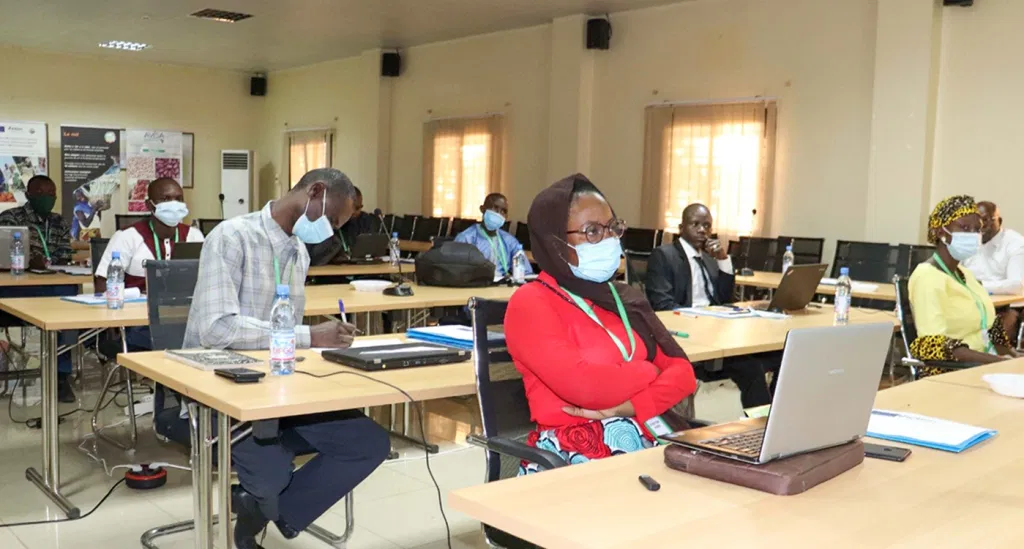Budding agricultural researchers are being trained in crop modeling to take on pressing and ever-present challenges of land, climate and food security. In a recent training program at ICRISAT-Mali, eight students learned to model agrosystems with DSSAT software, taking into account smallholder farming constraints.
Crop modeling is a process that describes different stages of crop growth and development depending on weather, climate and soil conditions adapted to the environmental context, explains Mr Adama Douyon, a student completing his master’s research in the Smart Food component of the EU-APSAN-Mali project (Enhancing Crop Productivity and Climate Resilience for Food and Nutrition Security in Mali). The training was taken up as a part of the project’s activities.
“The training’s main objective was to provide learners with knowledge of crop modeling using processes in plant nutrition and physiology, agricultural sciences, soil physic and hydrology, environment and meteorology. With the DSSAT model (dssat.net), they were given current concepts used in the modeling of the processes that determine plant growth,” said Dr Nadine O Worou, agronomist and a specialist in crop modeling at ICRISAT-Mali, who organized the trainings and instructed the participants.
The seven-session training was held on 7 and 8 December 2020 for doctoral and master’s students in breeding, environmental sciences, agronomy and agricultural economists. They were recruited for supporting research activities in the project.

“I understood how to integrate the data into the model, to simulate and to interpret data resulting from the analysis,” Mr Douyon added.
At the end of the two-day training, the participants testified that the sessions enhanced their understanding of crop modeling approaches necessary for different climate change impact studies including those dealing with abiotic plant stress.
“I discovered DSSAT, a very interesting agronomic software. I also learned how to handle agronomic data and acquired essential notions of model sensitivity and data calibration. This will help me make simulations precise,” noted Mr Adama Coulibaly.
For others like Ms Kadiatou Toure, a PhD student deep diving into research, the training has helped comprehend real-world applications of modeling and shape plans for future experiments. And for some like Mr Kibarou Richard Denou, the training has made clear the differences between modeling and simulation.
“This training will be of great use to me in my future research work on sorghum modeling,” said doctoral student Mr Youssouf Bolozogola. He expressed the need for more training before he can apply his learnings.
Stressing the importance of regression analysis, Ms Adja Rokiatou Sangare said about DSSAT use, “I learned how to enter data, start a simulation, see the results, analyze the outputs and also check the parameters from regression analysis. The last step makes it possible to know if the model is good or not, and what to calibrate.”
“The simulated and observed values must be evolved to conclude that we have a good result. We can reduce model errors by making a calibration if the need arises,” added Mr Sékou Armand Sanogo.
“I would like a follow-up system to be put in place to support the students as they move to practicing what they have learned,” Mr Fabrice Feï-ingtena said, voicing the group’s demand.
| Project: Enhancing Crop Productivity and Climate Resilience for Food and Nutrition Security in Mali (UE-APSAN-Mali) Funder: European Union Partners: Institut d’économie rurale (IER), Organisations des producteurs (Union locale des producteurs de céréales-ULPC), Sene Yiriwaton, Coopérative des producteurs de semence du Mande – COOPROSEM, Union Nietaa et Jigiseme, Services de vulgarisation agricoles, Direction nationale de l’agriculture-DNA et particulièrement les Secteurs d’agriculture de Kayes, Ségou, Kita, Koutiala et Yorosso, ONGs (Mali Agricultural Market Development Trust- MALIMARK, European Cooperative for Rural Development-EUCORD, Association Malienne d’Éveil au Développement Durable-AMEDD) et Compagnies semencières (Société de Production de Semences Améliorées- SOPROSA, Camara Semence, Doun ka fa, Faso Kaba et Zamoho); Universités au Mali, CORAF/WECARD and ICRISAT. CGIAR Research Program: Grain Legumes and Dryland Cereals |

